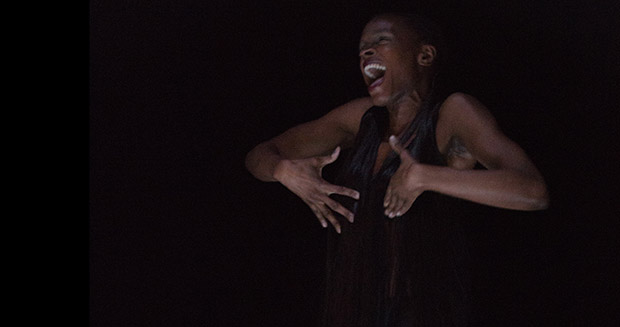
© Caroline Ablain. (Click image for larger version)
Maud Le Pladec & Okwui Okpokwasili
Hunted
★★✰✰✰
London, Lilian Baylis Studio
16 November 2017
www.facebook.com/maud.lepladec
www.ccn-orleans.com
lmcc.net/person/okwui-okpokwasili
www.sadlerswells.com
Banshee wailing, ululating and orgiastic groans come out of the dark recesses of the Lilian Baylis. It’s a voice that is pushed to the limits of its vocal range. Slowly the body of the voice emerges from the shadows and appears in the thin strip of light far downstage, up close to the audience. Twisted, hunched, grimacing – she’s a woman possessed. When she sees us, she straightens up and laughs, then regains composure. She is Dorothee Munyaneza, a striking woman wearing a dress of black hair.
HUNTED from CCNO – Maud Le Pladec on Vimeo.
Munyaneza invokes witches in this intense, raw solo, co-directed by Maud Le Pladec (Centre chorégraphique national d’Orléans) and Okwui Okpokwasili. She talks in tongues, she speaks in verse, she lectures and rants, drawing on a mixture of folklore and political language, reclaiming witches from history as powerful, revolutionary women. Her mission is to represent the women from around the world, from different cultures who were self-proclaimed witches and were considered a threat to patriarchal societies: healers, lesbians, dancers, revolutionaries and activists.
Although there is little dance in Hunted, movement is unconventionally theatrical, drawing on practices such as Butoh, Dadaism, Expressionism. It’s both repellent and seductive and inextricably linked to the voice. Fragmented action that is mostly confined to the torso, arms and neck courses through her upper body in waves and judders, while her head is snapped into distorted tilts. She grimaces and howls one minute then sings softly the next. At one point she folds from the waist, stretching out her spine like a vertical plank and grips us with her beady gaze. She tells us she is going to cook something for us. Who would dare refuse.
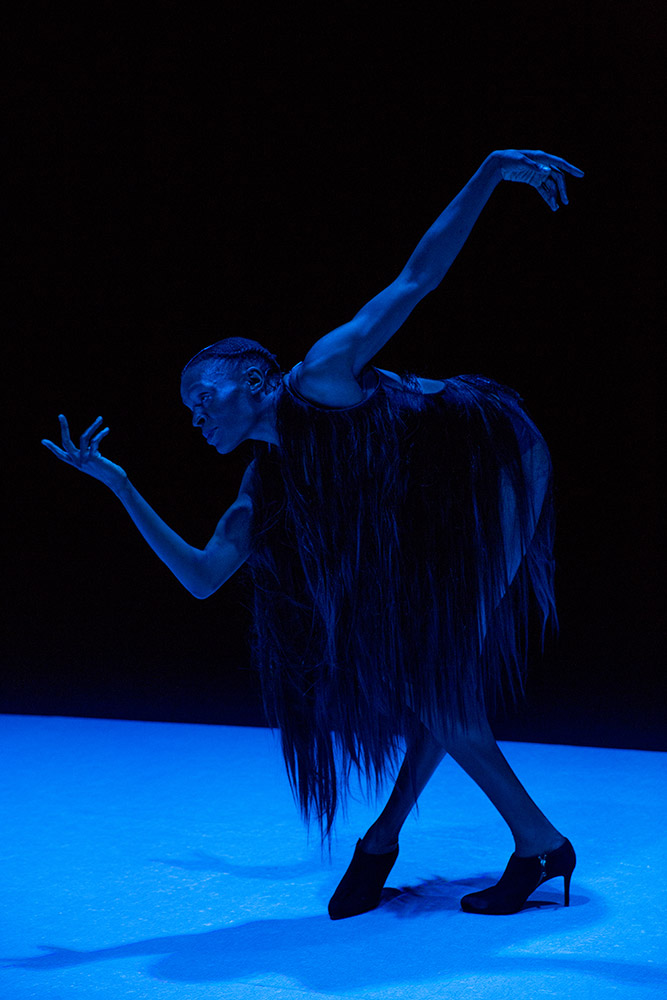
© Caroline Ablain. (Click image for larger version)
Munyaneza slips in and out of different characters from the modern and real to the mythical and extraordinary. She talks explicitly about female sexuality, referring to the anarchic German-Jewish dancer and performance artist Valeska Gert, who danced out orgasm in a 1920’s Berlin performance. She also alludes to the stark expressionistic gestures of Mary Wigman, (Witch Dance, 1926) dance and the canny, cackling witches from Macbeth. She recalls the heroic Jamaican Voodoo sorceress Nanny, who led a slave rebellion against British slave-masters and the much-maligned but admirable Medea of Euripidean tragedy. She becomes a forceful politician who climbs over members of the audience to address individuals about capitalism, land-grabs and women disposed; and an evocative story-teller as she talks passionately about the medieval witch hunts in which 80,000 women were killed.
Munyaneza’s at her most scary when she throws her body into the bewitched convulsions of Obeah, the Nigerian sorcery that was practiced by black slaves across the Caribbean. Grotesque, intoxicated and incoherent, she holds her head at a broken angle and whizzles it from side to side, like a scene from the Exorcist. There’s a dangerous unpredictability in her neo-paganistic act: her writhing body, eyes rolling, arms snaking around in the semi-dark. It’s uncomfortable and uncompromising. But how great to see a woman performer giving her audience a hard time! She strips away the repressive aesthetics of female beauty and the disempowering performance expectations of female dancers.
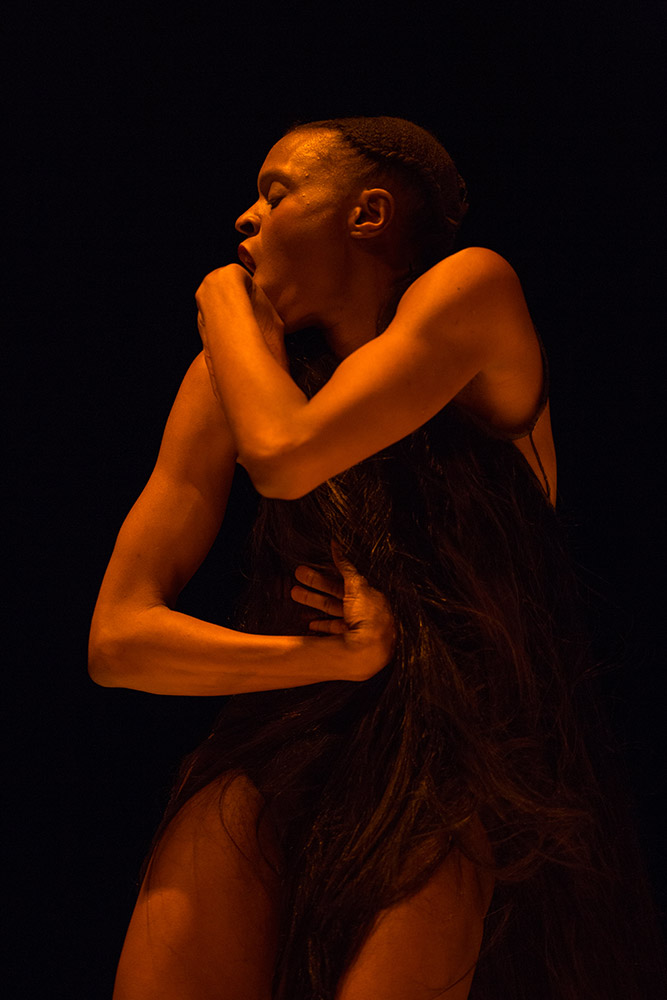
© Caroline Ablain. (Click image for larger version)
Hunted is crammed with fascinating ideas, sources and references, not all of which are apparent in this short solo. Le Pladec and American writer/performer Okpolwasili were inspired by books such as Anna Colin’s Witches: Hunted, Appropriated, Empowered, Queered, and as a result have created an exciting fusion of story-telling and ritual, but it’s an uncooked solo which begs to be developed into a more elaborate work. The accordion music by Finnish composer Kalevi Aho is atmospheric but charmless and it’s a pity that we only see the two musicians, Jean-Etienne Sotty and Fanny Vicens at the end. Munyaneza rises to the challenge of the show with her provocative, fearless performance, but it’s still difficult to sit through.

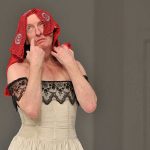
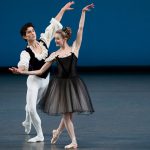
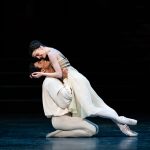
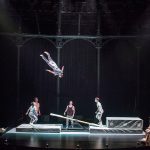

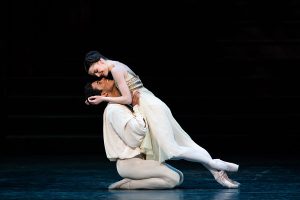
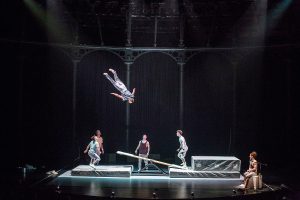
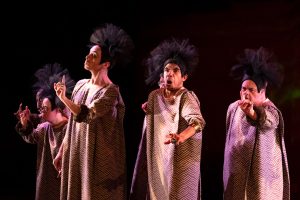
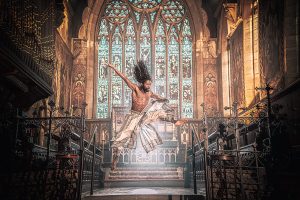
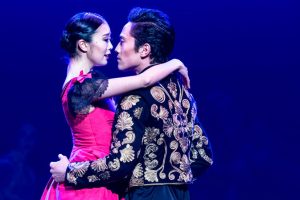
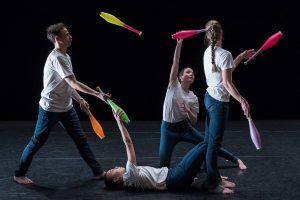
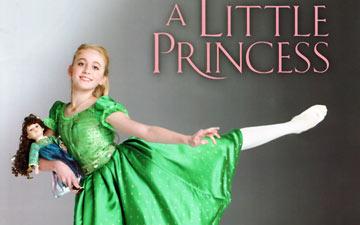
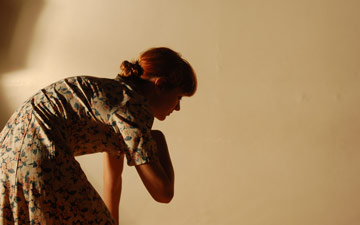
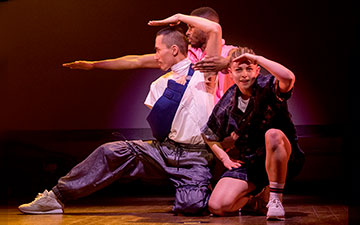
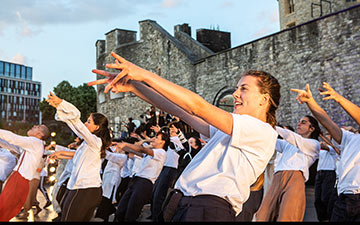
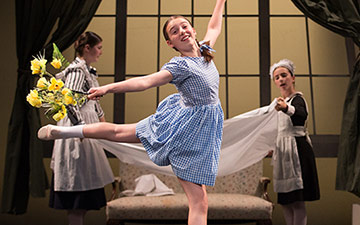
You must be logged in to post a comment.